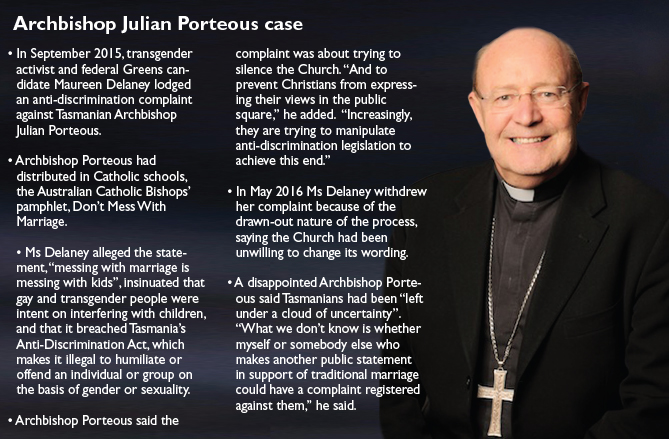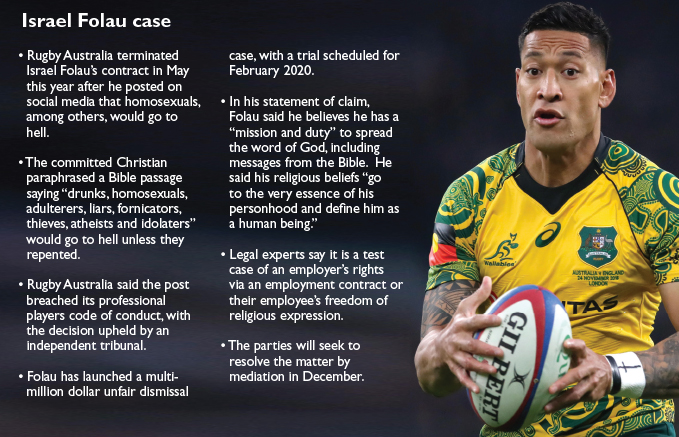 
.
Religion has long been a hot button issue and recent debates about same-sex marriage, abortion and euthanasia have forced the Church to campaign and defend its teachings.
Now the focus has shifted to religious freedom, with an exposure draft of the Australian Government’s religious discrimination bill released on August 29.
Already the battle lines are drawn.
While freedom of religion seems innocuous enough and is widely accepted – that everyone is entitled to their own belief (or non-belief) and to speak, teach and live accordingly – the question is to what degree.
Families can choose to send their children to taxpayer-funded Catholic schools but how Catholic can that school be? Can our schools insist that staff teach and support Catholic teaching, for example, that marriage is between a man and a woman? And what if staff do not?
That issue is in the spotlight with news of a test case by a former teacher at Ballarat Christian College, who claims she was discriminated against for her support of same-sex marriage.
Activist group Equality Australia is backing mother-of-three Rachel Colvin’s claim, which she lodged with the Victorian Civil and Administrative Tribunal in mid-September.
Ms. Colvin claims she was forced to leave after refusing to adhere to the school’s policy on same-sex marriage. The school’s enterprise agreement contains a clause that “all employees are expected to possess and maintain a firm belief consistent with the Statement of Faith of the college.”
In a media statement, Equality Australia CEO Anna Brown said Australians should not be “hounded out of jobs” because their religious beliefs support same-sex relationships and respect LGBTIQ people.
Ms Brown criticised the school for seeking to “impose its narrow-minded version of Christianity and control the personal beliefs of its staff.”
The government’s religious discrimination bill seeks to address some of these issues, which is not an easy task.
ACU Vice-Chancellor Prof Greg Craven wrote recently, “This is the problem with human rights, like freedom of religion. It is not whether you agree with them in abstract but which right wins when religion collides with freedom of speech, or association, or sexual expression.
“In the Western world, the practical answer is clear enough. Religion is the 12-pound weakling of human rights.
“Faced by almost any other demand, it will be sacrificed by politicians, legislators and bureaucrats, particularly if they are ‘progressively’ inclined.”
That is what most concerns the Church, that the bill downplays the centrality of faith in the multitude of rights.
Not surprisingly, Equality Australia has slammed the bill, claiming it “privileges the interests of religious institutions over the rights and freedoms of everyday Australians.”
Sydney Archbishop Anthony Fisher has warned that activist-backed legal cases threaten the future of Australia’s faith-based schools.
One in three of Australia’s 3.9 million school students attend faith-based schools. And 60 per cent of that cohort are in our 1746 Catholic schools, which shows the importance and influence of Catholic education in Australia.
Archbishop Fisher, who chairs the Bishops’ Commission for Catholic Education, called on Attorney-General Christian Porter to “urgently clarify” if faith-based schools and other institutions would be protected in such legal cases.
And he criticised both major political parties for failing on a promise to protect religious freedom after same-sex marriage became law.
“Two years later and we are still awaiting adequate religious freedom protections,” Archbishop Fisher said. “Two years later and religious schools are being subjected to exactly the sort of lawfare they said they feared and our leaders promised would be prevented.”
Archbishop Fisher slammed the Equality Australia activism which he said seemed to have been “carefully timed in an attempt to derail current efforts to protect religious freedom in Australia.”
“It is the same style of activism that sought to weaponise state anti-discrimination law against Archbishop of Hobart, Julian Porteous, for distributing pamphlets about Catholic teaching on marriage,” he said.
“This case challenges the right of religious schools to teach that marriage is between a man and a woman and to require staff not to undermine that teaching.
“It contests the right of parents to choose schools that accord with their own religious beliefs.”
* References: Institute for Civil Society (ICS) www.ic4s.com.au
|